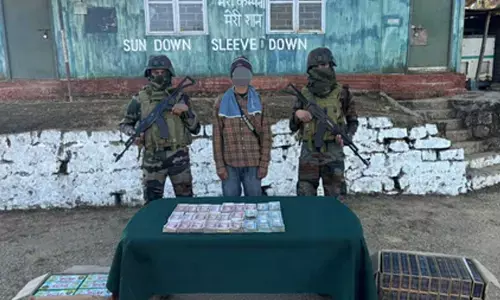Losing records a serious crime

The department concerned must necessarily fix the responsibility for the loss of the record and take appropriate departmental action against the officers/officials responsible for loss of the record. Registering an FIR in the cases of missing files will be an empty formality.
The department concerned must necessarily fix the responsibility for the loss of the record and take appropriate departmental action against the officers/officials responsible for loss of the record. Registering an FIR in the cases of missing files will be an empty formality.
Unless files are stolen or destroyed, which amounts to crimes, the police has no role to play. Missing files could be a potential strategy to undermine the rule of law and criminal justice systems, besides enabling white collar criminals to escape
One Balendra Kumar sought details with regard to the file notings of all corresponding papers of a file; he gave the file number also. But, the CPIO said the file was not traceable. In first appeal, a couple of papers were given. The CPIO stated that the office had made all possible efforts to find out the missing file and even went to different sections of the departments concerned but failed.
The defence of missing file cannot be accepted even under the RTI Act. If the file is really not traceable, it reflects the inefficient and pathetic management of files by the public authority. If the file could not be traced in spite of best efforts, it is the duty of the respondent authority to reconstruct the file or develop a mechanism to address the issue raised by the appellant.
The Central Information Commission feels that lodging of FIR is not the remedy in such cases, as one cannot expect the police to come to the office and trace the file. According to law, police does not have any responsibility to trace the missing files, as they will come into picture only when there is theft of files. It cannot be said that police should come to office and search for the files or things misplaced due to negligence or deliberate action or by mistake etc. It is the duty of the PIO to make necessary efforts to trace the file and inform the same to the appellant in the form of an affidavit.
The public authority has a duty to designate “Public Records Officer” as per Public Records Act 1993. This Act is made to regulate the management, administration and preservation of public records. The definition of “Public Records” U/S 2(e) of Public Records Act, 1993 (PRA 1993) is almost identical with the definition of Records under the RTI Act 2005.
These Records can be sought under the RTI Act, 2005 as “Information” through RTI Application. The National Archives of India, under the Culture Ministry, and similar bodies at the State level are required to keep tabs on “public records,” and help government departments separate worthless files from those that must be saved.
The documents considered to be of “permanent nature’’ — but no longer required by the department which created them — are then shifted to the archives for safekeeping. There, they can be seen by research scholars. Loss of records that are required to be kept and maintained permanently, if considered as evidence in a case, should invite criminal complaint against officials under Sections 201 of IPC (punishable with imprisonment which is directly proportional to seriousness of offence charged from 7 years to 10 years and for life).
If these files are part of public record and form evidence in any case, its destruction would be a serious crime of destruction of evidence. Otherwise also, it brings in the liability under Public Records Act 1993 which can extend to imprisonment up to five years and up to fine of Rs 10,000.
Reading the Right to Information Act, 2005, with Public Records Act, 1993 and Indian Penal Code, will lead to serious consequences for those who lose the records, besides the disciplinary action from the top administration.
The Right to Information Act cannot be effectively implemented without properly implementing the Public Records Act, 1993. This Act mandates appointing an officer as ‘Records Officer,’ similar to PIO under RTI Act. It says that the records officer shall, in the event of any unauthorised removal, destruction, defacement or alteration of any public records under his charge, forthwith take appropriate action for the recovery or restoration of such public records.
Appropriate action could be ordering an inquiry and holding the persons responsible for the disappearance of the files. There are three requirements: a) recovering the file, b) finding out which employee is responsible followed by disciplinary action; and c) addressing problems arising out of ‘missing file’. No public authority has shown any such record that reflected their ‘appropriate action’.
Delhi High Court in Union Of India Vs. Vishwas Bhamburkar [2013(297)ELT500(Del.)] observed: “6. …. Even in the case where it is found that the desired information though available in the record of the government at some point of time, cannot be traced despite best efforts made in this regard, the department concerned must necessarily fix the responsibility for the loss of the record and take appropriate departmental action against the officers/officials responsible for loss of the record; 7.
Since the Commission has the power to direct disclosure of information provided, it is not exempted from such disclosure, it would also have the jurisdiction to direct an inquiry into the matter wherever it is claimed by the PIO/CPIO that the information sought by the applicant is not traceable/readily traceable/currently traceable.
Even in a case where the PIO/CPIO takes a plea that the information sought by the applicant was never available with the government, and if the Commission on the basis of the material available to it forms a prima facie opinion that the said information was in fact available with the government, it would be justified in directing an inquiry by a responsible officer of the department/office concerned, to again look into the matter rather deeply and verify whether such an information was actually available in the records of the government at some point of time or not.
After all, it is quite possible that the required information may be located if a thorough search is made in which event, it could be possible to supply it to the applicant. Fear of disciplinary action, against the person responsible for loss of the information will also work as deterrence against the willful suppression of the information by vested interests.
It would also be open to the Commission, to make an inquiry itself instead of directing an inquiry by the department/office concerned. Whether a particular case in which an inquiry ought to be made by the Commission or by the officer of the department/office concerned is a matter to be decided by the Commission in the facts and circumstances of each such case.”
The Commission noticed that even when the standing counsel appears on behalf of CPIO, simply saying, “we provide information the moment file is traced” or “the file which went missing is yet to be traced,” the PIO should have consulted the applicant and found out the details of the file instead of protracting the proceedings without any response or communication. There are instances of missing files in public offices where they have to permanently maintain certain public records. Efforts to trace files and inquire into or to take alternative measures all go missing.
Registering an FIR in the cases of the missing files will be an empty formality. Unless files are stolen or destroyed, which amounts to crimes, the police has no role to play. If someone misplaces the file deliberately or by accident, how can the police investigate and find it out?
What is the policy to deal with missing files? If the government does not have any policy to tackle the problem of missing files, that becomes the policy not to have anything to do with it. That naturally affects the entire administration and public at large. Then it has to give reasons to people why they have not drawn any policy as such, to prevent the frequent missing of files.
Assuming the Public Records Act 1993 is their consolidated policy, it is the duty of the government to explain what have they done to implement that Act. This is also an obligation under Right to Information Act. If the file could not be traced despite the best efforts, public authority has a moral and legal duty to address the grievance of the appellant and solve it with all sincerity. No such effort appears to have happened in this case also.
The Commission recommended to DoPT to bring out a comprehensive plan, policy and action programme to tackle the issue of the missing files, which has become a stumbling block in implementation of RTI, and devise means and resources for implementing Public Records Act, 1993. Missing files could be a potential strategy to undermine the rule of law and criminal justice systems besides facilitating several white collar criminals in the public authorities to escape.
Only a file which might contain proof of irregularities or corruption will go missing. In such cases, it will be almost impossible to catch the criminal. Causing destruction of evidence is a crime under Indian Penal Code, which also needs to be probed and culprits be prosecuted. The Commission issued show cause notices and directed that a report be furnished. (Based on the order on 11.4.2017 in CIC/BS/C/2016/000025, Balendra Kumar v. PIO, M/o Labour & Employment)














